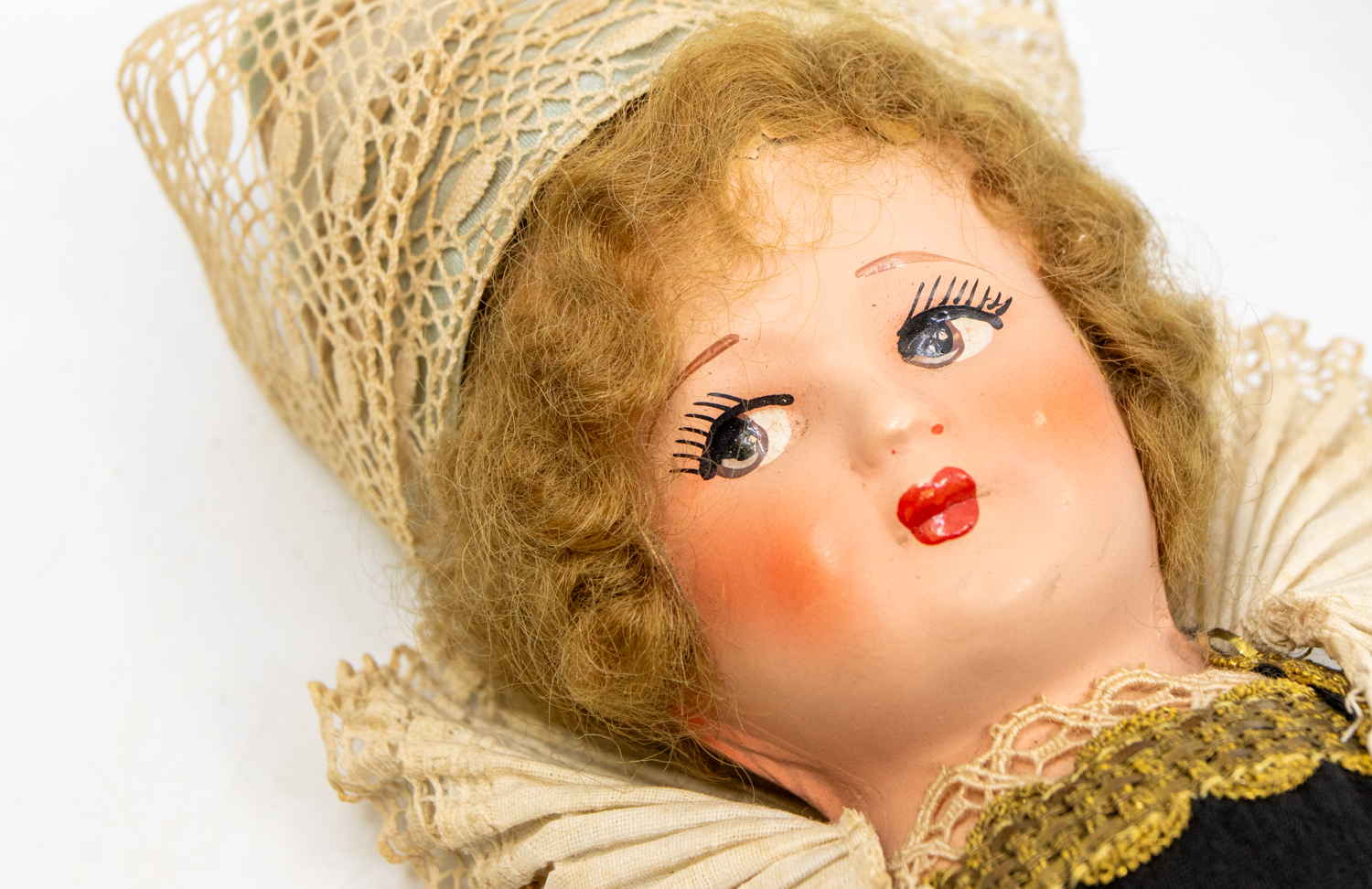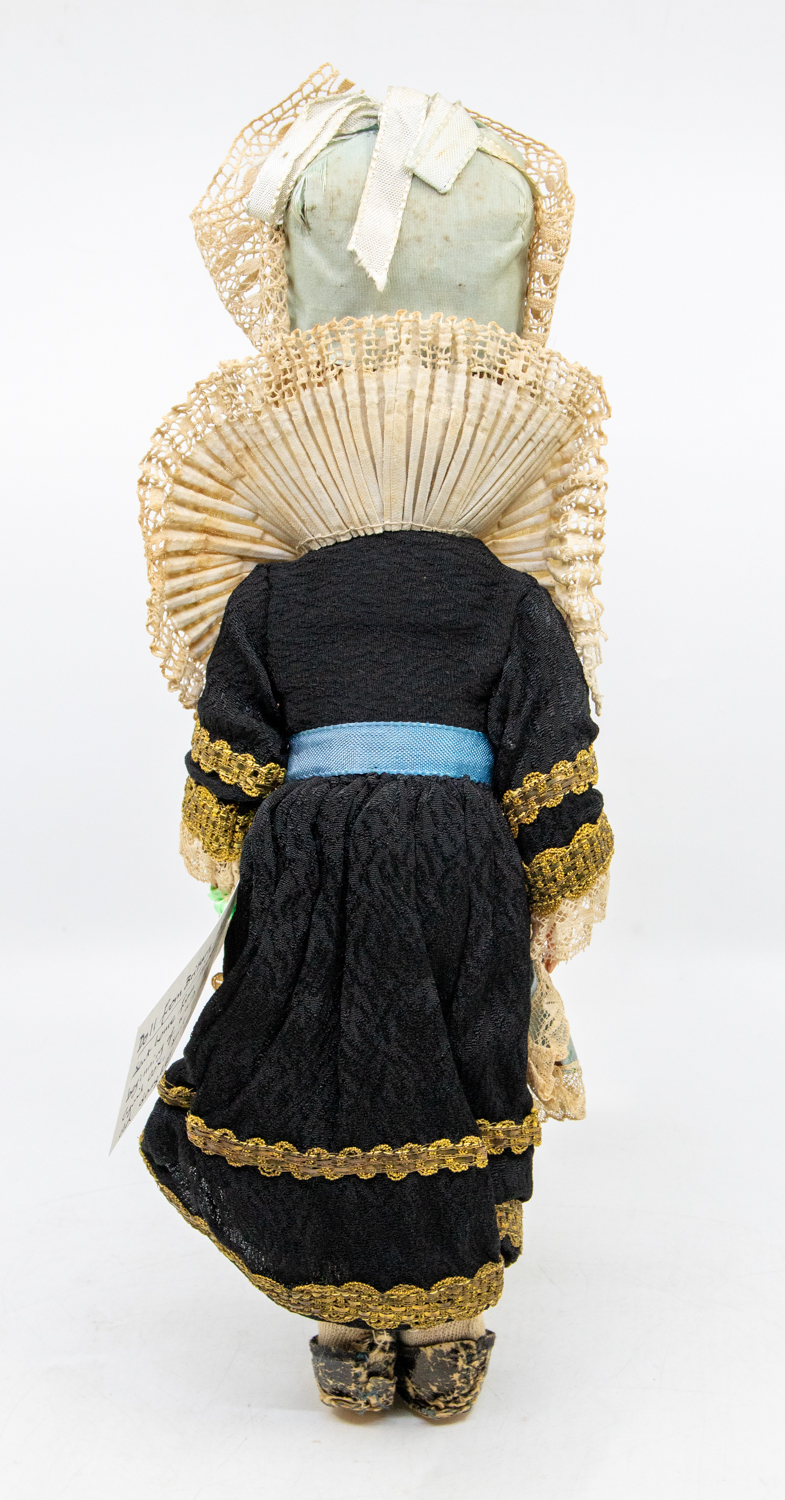Wartime French doll in toy auction
 A French doll sent to a little girl by her father in wartime 84 years ago – ‘a memento of hope amid conflict’ – is set for auction.
A French doll sent to a little girl by her father in wartime 84 years ago – ‘a memento of hope amid conflict’ – is set for auction.
The dark clouds of World War Two tore Mary Cox’s family apart in 1939. Her father, Cyril Cox, was conscripted into the British army and forced to leave his wife and children.
It was a deeply traumatic time. Though only small, Mary remembers the sadness they all felt. Nevertheless, on December 1, 1939 – her 4th birthday – something happened to cheer them. A special parcel arrived at the family home in Poole, Dorset, from France.

Mary recalls her excitement on discovering something quite beautiful inside – a charming Brittany doll in traditional lacy folk costume. Sent with love by her father, she immediately adored it. She has kept it for 84 years. However, at the age of 88, the retired teacher has finally decided to let her treasured toy go. It will be offered in Hansons Auctioneers’ January 25 Toy Auction with an estimate of £60-£80.
Mary, who lives near Derby, said: “It seems sad to part with the doll now but my younger family members are not especially interested in keeping her, so I hope she can find a new home where she will be treasured and her war time history and travels around the country remembered.
“The doll wouldn’t have spent a lifetime with me if there hadn’t been a war. It’s difficult reflecting on those wartime experiences as they were so traumatic. The memory of those years has lasted a lifetime. It’s probably hard for those who haven’t lived through a war to appreciate the emotional effect, but as a family we would readily be in tears at mention of the war and even now, some 84 years later, days like Remembrance Sunday are hard to get through.
“When war broke out in 1939 we were living happily in Poole – my mother Frances, father Cyril, brother Dennis, then six, and me, aged three. My father was immediately conscripted to serve in the army in the RAOC Regiment. By September 12 he was in France.

“Correspondence was brief and locations unknown. We know he marched far and wide from place to place. On December 1 it was my 4th birthday when the parcel arrived with the doll. It became a treasured possession. As the war progressed toys, as with most things, were extremely limited.
“My mother coped with looking after two children but the war years were difficult and our experiences were chequered and traumatic, from having evacuees planted on us, or us being the evacuees!
“My father’s French experience came to an end in June 1940. Many soldiers were rescued at Dunkirk but his regiment was stranded. After a long March to Nantes with the enemy advancing, he eventually evaded the Germans by boarding a stricken vessel, the Oronsay, to attempt the journey to England. Enemy aircraft circled overhead. The ship was bombed but stayed upright.
“A neighbouring ship, The Lancastria, sank. He witnessed the horror of its loss with some 3,000 people aboard. After several days at sea his ship limped into Plymouth harbour. He was then posted to
Chilwell Barracks Toton, Long Eaton, Nottingham, to work on munitions. He stayed there for the rest of the war.
“After a period of family separation he found a house in Toton for the four of us. So we moved from Poole leaving behind our beautiful house. This next residence was short lived as within three months the house was requisitioned by the army. Unable to return to Poole as our home had been rented, we were homeless.
“With difficulty we shared a small house with the family of an army friend. After some time we managed to find a house to rent in Beeston, Notts, but immediately had evacuees billeted on us. We had no furniture and used orange boxes for cupboards. We had no toys of significance and spent time skipping, jumping, climbing trees and playing on bombed building sites. However, as a child I accepted what we had and do not remember being unhappy. During all these upheavals the doll and a teddy came too and had pride of place.
“Eventually after six years the war ended. My father, looking to improve his position, became a director of a House Furnishers company in Haslemere, Surrey. We moved on my 10th birthday in 1945 and, having not yet made friends, I had a little birthday party with the doll and the teddy bear!
“At first we lived in cramped conditions, all sharing the same bedroom, but eventually we were able to build our own small house and resume a life something like that experienced before the war.
“I went to the local grammar school, took college and university courses, became a teacher and spent most of my career training and educating teachers in various parts of the country – Salisbury, Leeds, Lancaster and Coventry. My final post was at the University of Derby. Throughout many moves possessions came too, including the doll. She continued with me wherever I went.
“In their latter years, my parents came to live near me in Derbyshire until they died, both aged 83, in 1987 and 1989 respectively. The sadness of the effect of war on our family is perhaps better summed up in my mother’s words:
‘After 10 years of happily married life and producing Dennis and Mary our lives changed completely on September 1, 1939 (the start of WW2). Cyril had joined the Supplementary Reserve and, as war clouds gathered, we both knew what would happen but said very little. Cyril chopped sacks of wood and made black-outs for the windows and doors. In August the dreaded call up paper came. On September 1 Cyril called to say goodbye to his mother and father. He left for France on September 3. The Prime Minister spoke on the wireless to say war had been declared.’
“The sadness is also reflected in a photo I have of my mother, brother and me. It was taken days after my father had left for the army. It’s important to remember they had lived through WW1 with its death, destruction and loss of family members.”
Hansons said: “This special doll has an important tale to tell that will resonate with people all over the world. Millions of families have suffered, and are still suffering today, due to conflict. Mary’s story is one of many but it’s important that it should be told. The toy is a memento of hope amid conflict. It’s a reminder that family love will always find a way to rise above war and separation.”

